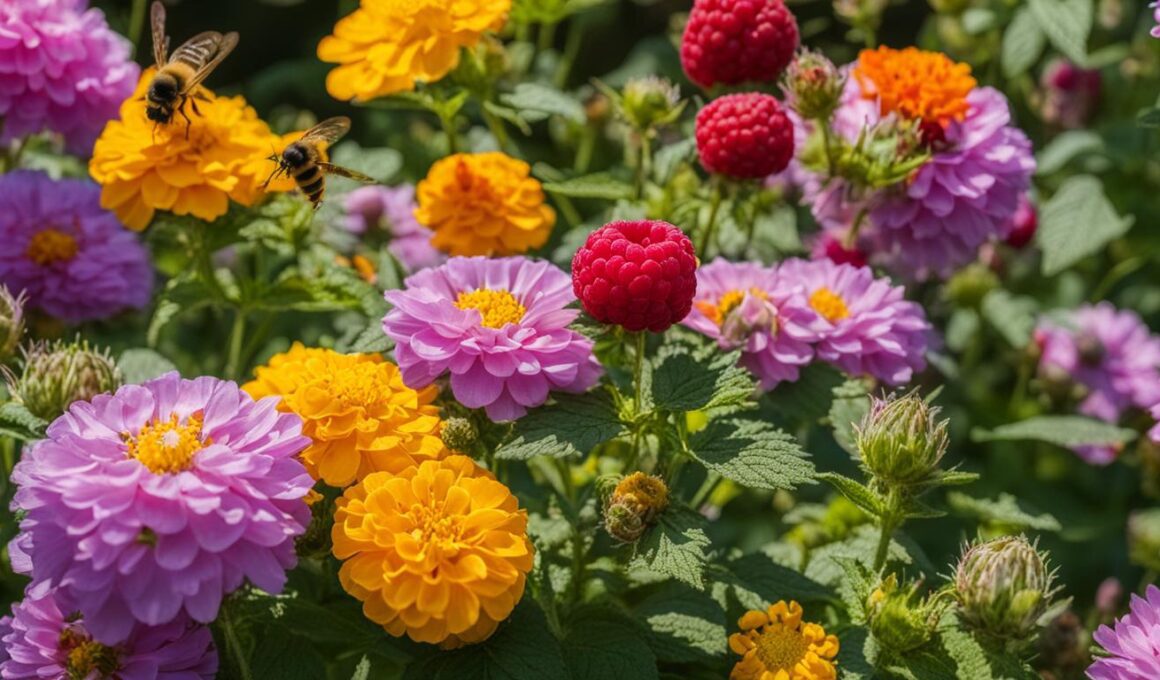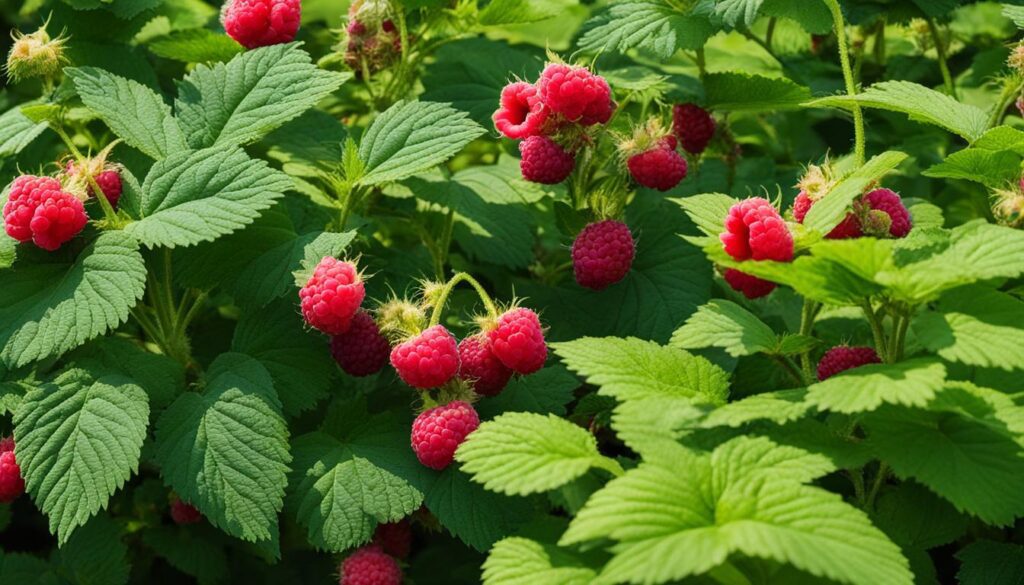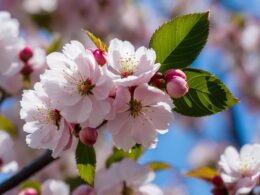Raspberries are a delightful addition to any garden, but they can sometimes struggle to reach their full potential. The key to boosting your garden’s health and enhancing the growth of your raspberry bushes lies in choosing the right companion plants. By carefully selecting plants that provide beneficial properties, such as repelling pests, attracting pollinators, and improving soil conditions, you can protect your berries and create a thriving ecosystem in your garden.
Good companion plants for raspberries include clover, sunflower, lavender, garlic, onion, chives, marigolds, nasturtiums, oats, and buckwheat. These cover crops can help enrich the soil, deter pests, and attract pollinators, ultimately enhancing the health and productivity of your raspberry plants. However, it’s important to avoid planting raspberries near potatoes, tomatoes, eggplant, or strawberries, as these plants can potentially spread blights and fungal diseases to raspberries.
Best Companion Plants for Raspberry Bushes
When it comes to companion plants for your raspberry bushes, there are several options that can help prevent fungal diseases, repel insects, and attract pollinators, ensuring the health and productivity of your plants.
One excellent companion plant for raspberry bushes is chervil. Chervil not only enhances the flavor of raspberries when planted nearby, but it also repels ants, Japanese beetles, cucumber beetles, and squash bugs, keeping your plants safe from these pests.
Another beneficial companion plant is tansy. This plant acts as a natural insect repellent, deterring ants, Japanese beetles, cucumber beetles, and squash bugs from your raspberry bushes.
Yarrow, with its beautiful flowers, also makes a great companion plant for raspberries. It helps repel harlequin beetles, ensuring the health of your plants.
Artemisia is another excellent choice. It not only repels a variety of insects but also keeps rabbits and deer away from your raspberry bushes, protecting them from potential damage.
Additionally, turnips can be used as companion plants for raspberry bushes. They are known to repel the harlequin beetle, helping to maintain the health and productivity of your plants.
By including these companion plants in your garden, your raspberry bushes will be well-protected from fungal diseases and harmful insects while attracting beneficial pollinators. The result will be healthy, thriving raspberry plants and a bountiful harvest.
Additional Companion Plants for Raspberries
In addition to the previously mentioned companion plants, there are other options that can benefit your raspberry plants. Lavender is an excellent companion plant for raspberries because its strong scent distracts harmful insects and masks the sweet scent of the berries. Nasturtiums are attractive flowers that also act as trap crops for aphids, weevils, and beetles, luring them away from the raspberries.
Rue is a shrubby perennial that repels pests of the rose family, such as Japanese beetles and aphids. Thyme adds protection against aphids, weevils, and whiteflies, while marigolds not only add beauty to the garden but also repel pests and act as a trap crop for slugs and snails.
Additionally, legumes like beans, peas, and clover can be planted near raspberries to enrich the soil with nitrogen and improve overall growth.
Remember to strategically position these companion plants near your raspberry bushes to maximize their benefits. Creating a diverse ecosystem in your garden with companion plants that attract pollinators, repel pests, and improve soil conditions will not only benefit your raspberries but also contribute to the overall health and productivity of your garden.
Conclusion
Choosing the right companion plants for your raspberry bushes can significantly improve their health and productivity. By selecting plants that repel pests, attract pollinators, and improve soil conditions, you can create a thriving ecosystem in your garden.
Planting cover crops like clover, sunflowers, and oats can help protect your raspberry plants from disease and pests, while also improving soil health. These cover crops provide shade and reduce competition for resources, allowing your raspberries to grow stronger and produce more bountiful fruit.
Incorporating herbs like garlic, lavender, and thyme in your garden can also provide numerous benefits to your raspberry plants. These herbs have natural repellent properties that can deter harmful insects, while their pleasant scents attract beneficial pollinators.
Additionally, legumes like beans and peas can enrich the soil with nitrogen, promoting healthy growth for your raspberry bushes. These nitrogen-fixing plants help replenish the soil’s nutrients, ensuring that your raspberries have all the necessary resources for optimal development.
By carefully selecting and planting companion plants for your raspberries, you can enhance your garden’s health and yield while protecting your berries naturally. Create a harmonious ecosystem and enjoy the rewards of flourishing raspberry bushes in your garden.
What Are Some Companion Plants That Can Benefit Both Raspberries and Blackberries?
When planting raspberries and blackberries, consider adding companion plants for blackberries such as yarrow, thyme, and garlic, as they can improve soil health, deter pests, and attract beneficial insects. These companion plants can help both berry bushes thrive and produce better quality fruit.










